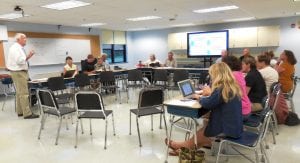
Facilitated discussion group at Gateway Regional on Wednesday. (Photo by Amy Porter)
HUNTINGTON – Following the passage in June of the Gateway Regional school budget and an amended assessment method by all six member towns, the Gateway facilitated discussion group met on Wednesday to consider the next steps for the district.
The facilitated discussion, a planning group of town officials, school officials and school committee members facilitated by retired superintendents Stephen Hemman, Jay Barry and Mac Reid of the Massachusetts Association of Regional Schools (MARS) were instrumental in forging the new assessment method which equalized percentage increases to the towns.
On Wednesday, Barry said that the Department of Elementary and Secondary Education (DESE) agreed to allow Gateway to implement the new assessment method, thanks to a lot of hard work by the group, and providing the district bring its regional agreement up to date. He said the current agreement is not in compliance with state regulations. He also acknowledged that the district has made four or five attempts to revise it over the years.
“This group was voted by the School Committee to update the regional agreement,” Barry told them. He said his colleague Mac Reid, who has the most experience with updating regional agreements, will be doing an analysis of the document and bringing it forward.
Barry also said the two most important components that need to be in compliance are the assessment language, which Gateway has already defined; and the composition of the school committee. “We have a need to address those two issues first,” Barry said, adding that once they are settled, the rest should flow.
Running down the process, he said Reid would bring marked copies of the agreement to the meetings. At the end of the process, they would be asking the facilitated discussion group for final edits.
At that point, the agreement would go to Christine Lynch of DESE, who he said is an expert in reviewing regional agreements. “She gives us marked changes back, and them we come to a more finished product,” Barry said.
Following that review, the document would go through reviews by the state legal department and DESE. The next step would be a vote of endorsement by the facilitated discussion group and the School Committee. After those votes, the document would be sent to all of the town attorneys and to the school district attorney for review. The last step is a vote of approval by all of the six member towns at their town meetings.
“It takes a while to get through this,” Barry said, adding, “That’s the process we’re going to follow.”
John Baldasaro, chair of the Chester Board of Selectmen said he would like to see the process completed by next spring’s annual town meetings, which begin the first week of May.
Barry said the state requires that school committee composition reflects “One Person (One Man), One Vote,” which ensures that every school committee member represents approximately the same percentage of the district’s population. Currently, the regional school agreement has historic representation attached to each of the towns, which do not necessarily reflect the population in the towns. For example, Middlefield, which has a population of 527, has two school committee representatives, equal to that of Blandford, which has a population of 1,259. Likewise, Chester, with a population of 1,372 has three representatives, equal to Russell with 1,778, and Huntington with 2,181. Montgomery, which has 853 residents, also has two representatives.
Barry said according to a preliminary analysis of the region, with a total six-town population of 7,973 and 15 school committee members, each member should represent 532 constituents.

Facilitator Jay Barry of MARS. (Photo by Amy Porter)
Barry said there are five options that would bring the towns and the school committee into compliance. The first option would be to elect school committee members apportioned to the population. In that option, Huntington and Russell would each gain a school committee member, moving the total up to 4 for the two largest towns, and Middlefield, the smallest, would go down to one school committee member. This would increase the membership of the committee by one, and may still not be in compliance regarding representation.
The second option would be to elect all school committee members in district-wide biennial elections, which broadens representation for each member and satisfies the One Person, One Vote requirement.
The third option would be to elect members in district-wide elections with residency requirements; electing two members from each town, also satisfying the requirement.
The fourth option would be to keep the current composition of the committee and to weigh votes, meaning each person would have one vote, but it would be given a percentage weight. For example, in the current membership, each of the two representatives from Middlefield would have a .5 vote.
The fifth option would be appointment of school committee members by elected officials.
Barry said that DESE is going to look at how many constituents each school committee member represents on the committee by percentage, and will determine how close each member is to representing 532 residents.
Huntington member Melissa Nazzaro commented that the formula is just on paper. “We’re still carrying out our business,” she said.
Montgomery selectman Dan Jacques said he had a problem with calling it “One Person, One Vote,” when some of the votes are weighted. “It’s the dumbest thing I ever heard,” he said.
Barry said weighted votes are only counted in votes on the budget, for a superintendent, or in close votes. In response to a question, he said weighted votes do have to be considered in achieving a quorum.
Gateway Regional Superintendent David B. Hopson said that on one try the weighted vote option passed every town, but was rescinded by Worthington at the last minute. Worthington, which withdrew from the district in 2015, is still included in the current regional agreement; another issue which has to be addressed.
Hopson said the only other option that almost passed was district-wide elections with residency requirements. In this option, all school committee members would be on all town ballots.
Blandford Finance Committee member Martin Lynch said the weighted system is perfectly fair. “There is a formula involved, but every town has the same vote,” he said.
School Committee chair Michele Crane said this is her eleventh or twelfth year on the committee, and fifth time as chair. She said she is in favor of the most practical option, which is two members from each town in district-wide elections, to which Baldasaro agreed. “I think it gives more control to the citizens,” Baldasaro said.
Russell Finance Committee member Derrick Mason said he agreed the solution has to be practical and explainable to town officials. “This is going to take a lot more work,” Mason said, and asked why DESE is pushing this. Earlier, Russell Finance Committee member Ruth Kennedy also challenged the notion that the district was required to follow One Person, One Vote.
“We have to move beyond discussing whether we have to do this. This has been a huge speed bump for us,” Crane responded.
Barry said that the MARS committee would like the facilitated discussion group to make significant progress on its decision at the next meeting, which was scheduled for August 30.






